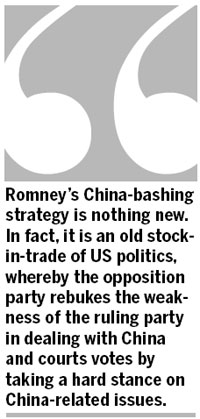Make the right choice
Updated: 2012-04-23 11:13
By Tao Wenzhao (China Daily)
|
||||||||
Instead of constantly blaming China for his country's woes, Romney should praise the benefits of their growing relations

Rick Santorum suspended his election campaign earlier this month, clearing the way for Mitt Romney to become the Republican Party's presidential candidate. Romney bases his platform on lowering tax rates across the board and bashing China, which he has been doing throughout his campaign.
His plan to rejuvenate the United States' economy, which he released in September, includes designating China a currency manipulator and taking punitive steps targeting China's trade with the US if China does not quickly move to float its currency.
"In the economic arena we must directly counter abusive Chinese practices in the areas of trade, intellectual property, and currency valuation," he wrote in an article in the Wall Street Journal earlier this year entitled, "How I'll Respond to China's Rising Power". He also argued that China cannot be a trusted partner in the international system, and security in the Pacific "means a world in which the US' economic and military power is second to none".
Romney's China-bashing strategy is nothing new. In fact, it is an old stock-in-trade of US politics, whereby the opposition party rebukes the weakness of the ruling party in dealing with China and courts votes by taking a hard stance on China-related issues. But the development of Sino-US relations over the past decades makes it clear that harsh words against China on the campaign trail should not be taken too seriously, as victory in the election will probably bring a change of attitude.
Yet the China-bashing bravado can cause relations between the two countries to suffer setbacks. All that campaign rhetoric is on record and is constantly used by the opposition party when the new president adopts a more pragmatic approach toward China. As a result, Sino-US relations have suffered setbacks immediately after presidential elections in the US.
Bill Clinton for instance dropped ugly comments about China and accused George H.W. Bush of being too "soft" on China during his 1992 presidential campaign. This hard line eventually softened after Clinton took office, but Sino-US relations followed an uneven course in the early days of his presidency and were revitalized only by both sides giving the relationship greater time and effort.
Despite this, during his 2000 election campaign, George W. Bush, labeled China a strategic competitor, which also disrupted bilateral relations in the first half of 2001 after he took office. Therefore, all US presidential candidates should be careful when using foreign affairs as a vote winner and should carefully consider the consequences before running off at the mouth.
This year, China and the US are commemorating the 40th anniversary of Richard Nixon's visit to China. Five Republicans, including Nixon, and three Democrats have been president since the historic moment and despite all China-bashing on the campaign-trail and changes in international situations during their terms of office, they all adopted an engagement policy toward China, indicating that the development of bilateral relations is the consensus shared by both US parties over the past 40 years. No matter which candidate finally takes office, it is in the US' interests to cooperate with China.
Playing the ideological card and making China the bogeyman might make it easy to win votes, given to the differences between China and the US in social institutions and ideologies, but such short-lived support will come at a price as it will harm the bilateral relations and divert public attention from the US' most urgent domestic problems. This is a hard-earned lesson from the Cold War and Mitt Romney should bear it in mind and restrain his wagging tongue.
The author is a researcher with the Institute of American Studies under the Chinese Academy of Social Sciences.

 Relief reaches isolated village
Relief reaches isolated village
 Rainfall poses new threats to quake-hit region
Rainfall poses new threats to quake-hit region
 Funerals begin for Boston bombing victims
Funerals begin for Boston bombing victims
 Quake takeaway from China's Air Force
Quake takeaway from China's Air Force
 Obama celebrates young inventors at science fair
Obama celebrates young inventors at science fair
 Earth Day marked around the world
Earth Day marked around the world
 Volunteer team helping students find sense of normalcy
Volunteer team helping students find sense of normalcy
 Ethnic groups quick to join rescue efforts
Ethnic groups quick to join rescue efforts
Most Viewed
Editor's Picks

|

|

|

|

|

|
Today's Top News
Health new priority for quake zone
Xi meets US top military officer
Japan's boats driven out of Diaoyu
China mulls online shopping legislation
Bird flu death toll rises to 22
Putin appoints new ambassador to China
Japanese ships blocked from Diaoyu Islands
Inspired by Guan, more Chinese pick up golf
US Weekly

|

|






